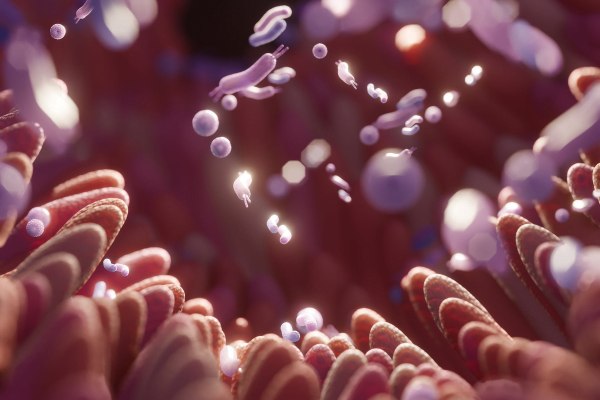Microorganisms, often known as microbes, are small living organisms such as bacteria, viruses, fungi, and others. These bacteria, which are present in the trillions, are mostly found on your skin and in your intestines. The majority of the microorganisms in your digestive system are known as the gut microbiome, and they are located in a “pocket” of your large intestine called the cecum. Your body actually contains more bacteria than human cells. The weight of these microorganisms can reach up to 2.5 pounds (1-2 kg), which is approximately equivalent to the weight of your brain. When combined, they act as an additional organ in your body and are vital to your overall well-being.
Why Gut Microbiome is Important?
A complex colony of trillions of microorganisms called the gut microbiome, or gut flora, inhabits your intestines. In numerous facets of your health, these microorganisms are vital. The majority of the thousands of distinct species of bacteria that live in your intestines are good for your health. On the other hand, illness might result from an excess of harmful bacteria.
Gut dysbiosis, a term used to describe an imbalance between beneficial and harmful bacteria, may be linked to weight gain. Numerous well-known studies have demonstrated that identical twins, one of whom had obesity and the other did not, had radically different gut microbiomes. This proved that variations in the microbiome were not caused by genetics.
Digestion – In addition to producing certain non-essential nutrients that your body can absorb, gut microorganisms assist in the breakdown of food that your body is unable to process on its own.
Immune system – Your gut microorganisms help your immune system identify and combat dangerous pathogens while allowing the body to tolerate healthy substances.
Mental health – There is growing evidence that the gut microbiome may have an impact on mental health. Studies have linked disorders like depression and anxiety to gut dysbiosis, or an imbalance in gut microorganisms.
General well-being – Although studies are still under progress, there is evidence connecting the gut microbiota to numerous different medical disorders, such as diabetes, heart disease, and obesity.
Controls blood sugar level – Additionally, blood sugar regulation may be aided by the gut flora, which may impact the risk of type 1 and type 2 diabetes.
A new study looked at 33 babies who were at a high genetic risk of having type 1 diabetes. It was discovered that prior to the beginning of type 1 diabetes, the microbiome’s diversity abruptly decreased. It also discovered that shortly prior to the beginning of type 1 diabetes, levels of several harmful bacterial species increased.
Here are a few specific examples of how the gut microbiota functions
Fibre digestion – Certain gut microorganisms have the ability to break down fibre, which your body is unable to achieve on its own. Short-chain fatty acids, which are advantageous for gut health and general wellbeing, are produced during this fibre fermentation process.
Vitamin production – Certain B vitamins and vitamin K are produced by certain gut bacteria.
Immune system regulation – By interacting with the immune system in a variety of ways, gut microorganisms assist in keeping the body safe from pathogens and tolerant of chemicals that are good for it.
Eating a balanced diet – The nutrients required for the gut microorganisms to flourish are found in a diet high in fruits, vegetables, and whole grains.
Sleep – Getting adequate sleep is essential to maintaining good health generally, which includes gut health.
Managing stress – Prolonged stress may be detrimental to the gut microbiota.
How Can You Improve Your Gut Microbiome?
Consume a variety of foods – Since doing so can result in a varied microbiome, which is a sign of healthy gut flora. Legumes, beans, and fruit in particular are high in fibre and can encourage the growth of beneficial Bifidobacteria.
Consume fermented foods – Fermented foods can lower the number of disease-causing species in the gut because they include good bacteria, primarily Lactobacilli. Examples of these foods are yoghurt, sauerkraut, and kefir.
Reduce the amount of artificial sweeteners you consume – Research suggests that aspartame and other artificial sweeteners encourage the growth of harmful bacteria like Enterobacteriaceae in the gut microbiome.
Consume foods high in prebiotics – Prebiotics are a kind of fibre that promotes the development of beneficial microorganisms. Apples, oats, bananas, asparagus, and artichokes are among the foods high in prebiotics.
Breastfeeding is crucial for the development of the gut microbiome – According to a study, infants breastfed for a minimum of 6 months had higher levels of beneficial Bifidobacteria than bottle-fed infants.
Consume whole grains – They are high in fibre and good carbohydrates such as beta-glucan, which are broken down by gut bacteria to help with weight, cancer risk, diabetes, and other conditions.
Try eating a plant-based diet – Vegetarian diets may help lower cholesterol and inflammatory levels, as well as microorganisms that cause disease like E. coli.
Consume a diet high in polyphenols – Plant chemicals called polyphenols can be found in whole grains, olive oil, red wine, green tea, and dark chocolate. The microbiome breaks them down to promote the growth of beneficial microorganisms.
Take a probiotic supplement – After dysbiosis, probiotics, which are living bacteria, can aid in reestablishing the gut’s natural balance. They achieve this by “reseeding” it with beneficial bacteria.
Use antibiotics only as required – Antibiotic resistance and weight gain may be related to the destruction of several beneficial and harmful bacteria in the gut microbiome by antibiotics. Therefore, only use antibiotics when prescribed by a physician.
Conclusion
Trillions of different bacteria, fungus, and other microorganisms make up your gut microbiome. The gut microbiome regulates digestion, strengthens the immune system, and supports numerous other elements of health, all of which have a significant positive impact on your overall health. Weight gain, excessive blood sugar, high cholesterol, and other conditions may be influenced by an unbalanced population of beneficial and harmful bacteria in the intestines. Eat a wide range of fruits, vegetables, whole grains, and fermented foods to promote the growth of beneficial bacteria in your digestive system.
Nesha Felciya,
Clinical Dietitian, Simplyweight





